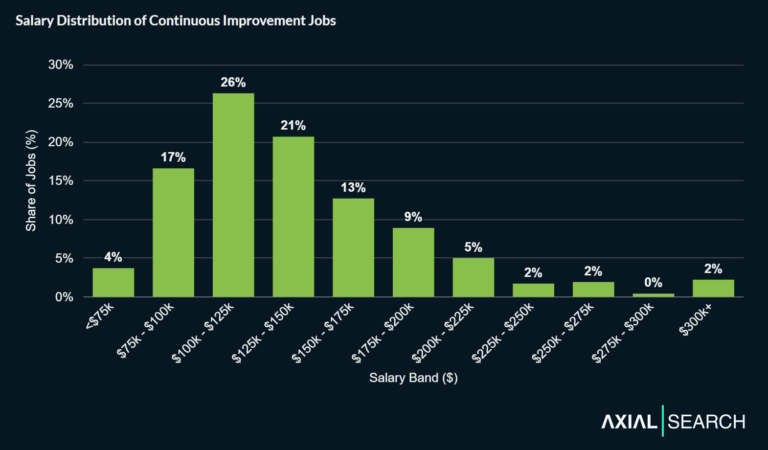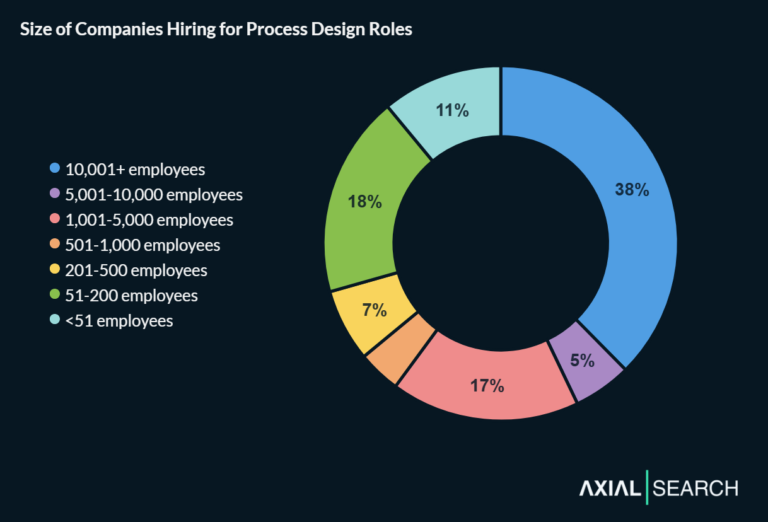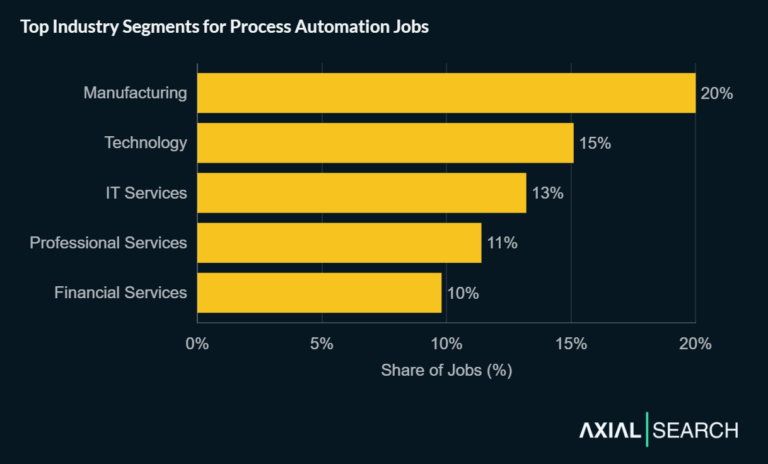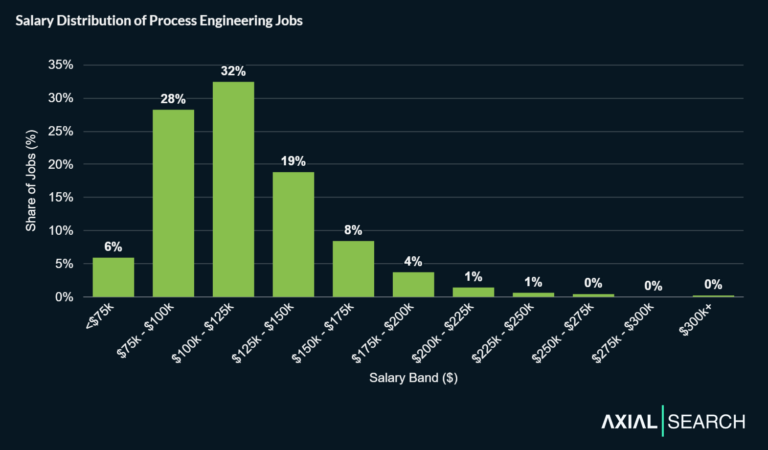Why workflow automation jobs drive business value
Workflow automation professionals solve a fundamental business challenge: eliminating waste and accelerating outcomes through intelligent orchestration of people, systems, and data. They translate strategic automation initiatives into operational reality.
The impact of these process optimization professionals shows up in measurable business outcomes. Cycle time—the total duration from process start to finish—often drops significantly when workflows are automated. First-pass yield, the percentage of units completing a process without rework, typically improves as automation reduces errors and variability.
These operational improvements translate directly to financial returns. Workflow automation professionals should be able to point directly to improvements in business metrics such as Hours Saved and Cost Saved to quantify the financial impact of automations, thereby giving executives clear visibility into the value they are generating.
Takeaway: Workflow automation jobs transform operational efficiency into measurable business value through systematic process redesign and intelligent orchestration of technology and human work.
What are the main duties in workflow automation jobs?
Workflow automation roles span the entire automation lifecycle, from discovery through production operations. These professionals work across industries and functions to streamline operations and integrate systems.
Core responsibilities include:
- Analyze current processes: Use process mining to discover, visualize, and identify bottlenecks and automation opportunities from event logs and system data.
- Design automated flows: Build and test automated flows with triggers, actions, and reusable subflows to streamline operations across systems.
- Develop software robots: Create, test, and maintain bots that automate repetitive, rule-based tasks across applications and data sources.
- Integrate applications: Connect systems and data using hundreds of prebuilt connectors and custom APIs to enable end-to-end automation across the tech stack.
- Design approval workflows: Build approval processes and exception paths that route tasks to people when decisions or reviews are required.
- Implement error handling: Add retries, catches, timeouts, and compensating logic to handle failures and make workflows resilient.
- Deploy and monitor: Schedule, monitor, and log automations in production; manage queues and credentials to ensure reliable operations.
- Track performance: Monitor automation performance and business impact with dashboards and KPIs to drive ongoing optimization and ROI.
- Manage versions: Use solutions, source control, and CI/CD pipelines to manage versions, promote between environments, and document changes.
- Establish governance: Implement environment strategy and data loss prevention policies; apply admin controls to secure data and govern automation at scale.
- Stand up Centers of Excellence: Build CoEs with templates, analytics, and guardrails; coach and support citizen developers to scale responsibly.
Takeaway: Workflow automation job responsibilities span discovery, design, development, deployment, and governance—requiring both technical automation skills and process improvement expertise to deliver sustainable business outcomes.
Where do automation specialist jobs fit into an organizational structure?
Workflow automation capability increasingly sits within dedicated teams that drive standards and scale across the enterprise. McKinsey advises creating a central capability for automation—a competence center or CoE—under a senior executive like the COO or CIO to set priorities, standards, and funding for scale.
Microsoft’s Power Platform guidance states that a Center of Excellence is a centralized function that owns governance, standards, and enablement for automation and low-code across the organization—typically anchored in central IT to drive consistency and scale. Accenture’s Automation Maturity research finds leaders centralize automation through a dedicated team or CoE and shared standards, which enables scaling and business-wide impact versus ad hoc efforts.
Collaboration models balance centralized governance with distributed development. The fusion team approach for automation brings professional developers and IT together with citizen developers and business domain experts to co-create and maintain workflows. ServiceNow recommends establishing citizen development guardrails and governance, with IT and platform owners setting policies and partnering with business teams to ensure secure, compliant workflow automation.
Takeaway: Workflow automation roles typically sit within centralized Centers of Excellence reporting to senior IT or operations executives, using fusion team models to balance governance with business-led development.
Key skills for success in workflow automation jobs
Workflow automation careers demand a unique blend of process analysis, technical development, and stakeholder management capabilities. Success requires translating business requirements into automated solutions that deliver measurable outcomes.
Essential skills include:
- Analytical thinking: The top core skill in 2023, critical for diagnosing processes, mapping value streams, and prioritizing automations based on impact and feasibility.
- BPMN modeling: Provides a standardized, executable notation for modeling business processes that is understandable by business and IT—foundational for designing automated workflows.
- Cloud flow design: Building flows with connectors, triggers, and actions—including approvals and conditions—is core to automating work across services.
- Custom connector development: Creating custom connectors to integrate systems demands understanding REST/OpenAPI definitions and supported authentication like OAuth 2.0.
- Event-driven architecture: Designing workflows with queues and streams decouples services, scales processing, and enables real-time automation.
- JSON parsing: Extracting and transforming payloads within automated workflows using expressions is essential for data manipulation across systems.
- Data loss prevention: DLP policies govern which connectors can be used together to protect data and enforce safe automation patterns.
- Process mining: Discovering and monitoring real processes from event logs is an increasingly vital capability in hyperautomation programs.
- RPA best practices: Reliable automations require modular design, exception handling, logging, and version control throughout development.
- ALM and DevOps: Managing automations with solutions, source control, and deployment pipelines across environments is a core competency.
- DMAIC methodology: Applying the define, measure, analyze, improve, and control method to processes underpins sustained automation gains.
- Stakeholder engagement: Essential to elicit requirements, manage expectations, and ensure solutions deliver intended outcomes.
- Intelligent document processing: AI Builder form processing extracts structured data from documents to automate intake workflows—blending AI with automation.
Takeaway: Success in workflow automation roles requires mastering process analysis, low-code development, integration patterns, and governance practices to deliver reliable, scalable automation solutions.
Which frameworks guide successful workflow automation projects?
Workflow automation professionals leverage established frameworks to diagnose opportunities, design solutions, and sustain improvements. Mastering multiple approaches allows practitioners to select the right tool for each context.
Key frameworks include:
- Business Process Model and Notation (BPMN): A standardized graphical notation for specifying business processes that bridges business and IT, enabling clear design and communication of executable workflows.
- DMAIC: A data-driven improvement cycle to baseline current performance, analyze root causes, implement changes including automation, and sustain gains with control plans.
- Value Stream Mapping: A lean method to visualize end-to-end flow of work, information, and time to expose waste and pinpoint high-impact automation opportunities.
- SIPOC: A high-level map of Suppliers, Inputs, Process, Outputs, and Customers that clarifies scope and interfaces before automating, reducing rework and misalignment.
- Process Mining: Uses event logs to discover as-is processes, check conformance to models, and enhance performance—critical for selecting automation candidates and monitoring post-implementation.
- Statistical Process Control: A discipline to monitor process behavior over time, distinguish common versus special-cause variation, and maintain stable automated workflows and SLAs.
- PDCA Cycle: An iterative learning cycle for piloting and refining automations safely, verifying outcomes, and institutionalizing continuous improvement post-deployment.
- Theory of Constraints: A system-level approach to identify and exploit the primary bottleneck, subordinate the system to it, then elevate it—ensuring automation targets true constraints and avoids local optimizations.
- Event Storming: A collaborative domain discovery approach centered on domain events that rapidly uncovers process scenarios, policies, and edge cases to inform workflow and decision design.
- Service Blueprinting: Maps frontstage and backstage actions, support processes, and evidence across channels to reveal handoffs, failure points, and backstage work suitable for orchestration and automation.
- Poka-Yoke: Lean techniques to design processes that prevent or quickly detect errors and to define the best-known method—vital for reliable automation and human-in-the-loop steps.
Takeaway: Proficiency across process mapping frameworks, improvement methodologies, and discovery techniques enables workflow automation professionals to diagnose opportunities accurately and design solutions that deliver sustainable business value.
What software is essential for a workflow automation career?
Workflow automation professionals work with diverse platforms spanning RPA, low-code, integration, and orchestration. Proficiency across multiple tool categories enables practitioners to select and combine the right technologies for each business need.
Core automation platforms include:
- UiPath: End-to-end automation platform for building, orchestrating, and managing robotic process automation and business workflows.
- Microsoft Power Automate: Service for building automated workflows that integrate apps, data, and services with built-in connectors.
- Automation Anywhere: Cloud-native RPA platform to automate business processes with bot development, orchestration, and governance.
- Blue Prism: Enterprise RPA to design, deploy, and manage digital workers for process automation at scale.
- ServiceNow: Low-code automation on the Now Platform including Flow Designer and RPA to digitize and orchestrate enterprise processes.
Integration and orchestration tools include:
- AWS Step Functions: Managed service to coordinate distributed applications and microservices with visual state machines and event-driven workflows.
- Google Cloud Workflows: Fully managed orchestration to connect services and APIs reliably with serverless workflows.
- MuleSoft: Integration and API management platform for automating processes and orchestrating systems via APIs and flows.
- Boomi: Low-code integration platform to connect applications and data, enabling automated workflows across systems.
- Camunda: BPMN and DMN-based workflow and decision automation for orchestrating human tasks, microservices, and RPA.
No-code and low-code options include:
- Zapier: No-code automation to connect SaaS apps and build multi-step workflows triggered by events.
- Make: Drag-and-drop automation to connect apps and design workflow scenarios with branching and scheduling.
- n8n: Open-source, self-hostable workflow automation and integration platform with nodes, triggers, and credentials management.
- Apache Airflow: Open-source platform to programmatically author, schedule, and monitor workflows as directed acyclic graphs.
Takeaway: Effective workflow automation careers require proficiency across enterprise RPA platforms, cloud orchestration services, integration tools, and no-code automation solutions to design and deliver end-to-end automated workflows.
Necessary qualifications for workflow automation jobs
Workflow automation roles typically require bachelor’s degrees in computer science, information systems, or related technical fields. The Bureau of Labor Statistics notes these positions require a degree in computer and information technology or related field, with relevant majors including computer science or information systems that underpin automation data flows.
Professional experience often carries more weight than specific educational credentials. Employers value demonstrated ability to analyze processes, build automations, and deliver measurable outcomes. Many successful practitioners transition from adjacent fields like business analysis, IT support, or operations management.
Technical proficiency forms the foundation. Understanding databases, APIs, authentication protocols, and scripting languages enables practitioners to integrate systems and troubleshoot complex automations. Experience with specific platforms like Power Automate, UiPath, or ServiceNow provides immediate value.
Process expertise complements technical skills. Knowledge of Lean, Six Sigma, or business process management methodologies helps practitioners identify high-value automation opportunities and design efficient workflows. Experience mapping and analyzing processes is highly valued.
Industry knowledge can differentiate candidates. Healthcare organizations seek familiarity with clinical workflows and regulatory requirements. Financial services values understanding of compliance frameworks and risk controls. Manufacturing emphasizes supply chain and quality management experience.
Takeaway: Workflow automation positions require technical degrees and proficiency with automation platforms, complemented by process improvement expertise and the ability to translate business requirements into automated solutions.
What certifications are recommended for workflow automation jobs?
Professional certifications demonstrate platform expertise and validate automation skills. Several vendor-specific and vendor-neutral credentials enhance career prospects and earning potential.
Platform-specific certifications include:
- Microsoft Certified: Power Automate RPA Developer Associate: Validates skills to automate and transform business processes using Microsoft Power Automate, including designing, developing, troubleshooting, and evaluating RPA and DPA solutions.
- UiPath Certified Professional: Role-based certification for building and deploying UiPath automations; UiPath’s program includes Associate and Professional tracks aligned to real-world RPA solution development.
- Automation Anywhere Certified Advanced RPA Professional: Vendor certification validating advanced bot-building on Automation 360; includes Master RPA Professional for expert-level practitioners.
- Blue Prism Developer Certification: Certifications focused on designing, building, and reviewing scalable Blue Prism automations and reusable objects through Blue Prism University’s program.
- Camunda Certified Developer: Certification that verifies proficiency modeling and implementing BPMN processes and DMN decisions with Camunda for orchestrating end-to-end workflows.
Application development certifications include:
- Salesforce Certified Platform App Builder: Validates ability to design, build, and implement apps using declarative tools on Salesforce, including business logic and process automation with Flow.
- Appian Associate Developer: Validates low-code application development on Appian, including process models, interfaces, data, and orchestration of automation features on the Appian Platform.
- Pega Certified System Architect: Demonstrates ability to design and build Pega applications, covering case management, process flows, data, UI, and rules central to workflow automation on the Pega Platform.
Process improvement certifications include:
- CBPP (Certified Business Process Professional): Vendor-neutral certification based on the BPM CBOK that validates end-to-end process management competencies essential for mapping and improving automated workflows.
Takeaway: Platform certifications from Microsoft, UiPath, and Automation Anywhere provide the most direct career value, complemented by process improvement credentials that demonstrate the analytical and design skills essential for workflow automation success.
Advancing your workflow automation career
Workflow automation offers clear progression paths with opportunities to specialize by platform, industry, or organizational scope. Career advancement typically follows increased complexity, leadership responsibility, and strategic impact.
Typical progression includes:
- Automation Developer/Analyst: Entry-level roles building and testing automations under guidance
- Automation Engineer/Specialist: Mid-level positions designing and implementing complete workflows
- Senior Automation Engineer: Experienced practitioners leading complex initiatives and mentoring others
- Automation Architect: Technical leadership roles defining standards, patterns, and platform strategy
- Automation Manager/Director: Leadership positions overseeing teams, programs, and organizational capability
Microsoft outlines Power Platform roles used in automation programs—Makers (Citizen Developers), Developers, Functional Consultants, Solution Architects, Business Analysts, and Administrators—reflecting common job titles for workflow automation professionals.
Entry points vary widely. PMI describes citizen developers as individuals who create applications without formal coding under IT governance, providing a structured pathway for professionals in business roles to move into workflow automation. Many practitioners transition from business analysis, IT support, or operations roles.
The democratization of automation is expanding opportunities. Microsoft’s 2024 Work Trend Index reports 75% of knowledge workers now use AI at work and 78% bring their own AI tools, signaling broad, bottom-up automation momentum and demand for formal workflow automation roles.
Specialization creates advancement opportunities. Practitioners can focus on specific platforms, industries, or automation types like document processing, API integration, or human-in-the-loop workflows. Deep expertise in emerging technologies like process mining or intelligent document processing commands premium compensation.
Practitioners should also look for opportunities to step into intelligent automation or process automation roles, which have slightly different titles but many of the same requirements.
Takeaway: Workflow automation careers offer clear progression from developer roles to architect and leadership positions, with growing opportunities as organizations scale citizen development programs and demand professional automation expertise.
Which professional associations support automation specialist jobs?
Professional associations provide networking, education, and credibility that accelerate workflow automation careers. These organizations offer certifications, research, and communities focused on process improvement and automation excellence.
Primary associations include:
- ABPMP International: ABPMP International is a non-profit, vendor-independent professional association dedicated to advancing Business Process Management—a core discipline underpinning workflow automation practice.
- IRPA AI: IRPA AI is an industry association focused on robotic process automation and intelligent automation, connecting practitioners, buyers, and providers across the automation ecosystem.
- AIIM: AIIM is the association for intelligent information management, helping organizations digitize, modernize, and automate information-intensive processes—central to workflow automation roles.
- APQC: APQC is a member-based nonprofit focused on benchmarking, best practices, and process improvement; its process frameworks and research are commonly used to standardize and optimize processes prior to automation.
These organizations provide certification programs, publish research, host local chapter events, and offer online communities where practitioners share challenges and solutions. Membership demonstrates professional commitment and provides access to resources that enhance automation expertise.
Takeaway: Active participation in associations like ABPMP, IRPA AI, and AIIM provides essential networking, professional development, and credibility that distinguish workflow automation professionals in the marketplace.
What events help grow your workflow automation career?
Professional conferences provide learning, networking, and exposure to emerging technologies that advance workflow automation careers. These events feature practitioner case studies, vendor demonstrations, and hands-on workshops.
Major automation events include:
- UiPath FORWARD: Global event focused on intelligent automation and RPA, showcasing end-to-end workflow automation, generative AI, and enterprise deployments.
- ServiceNow Knowledge: Enterprise workflow automation and digital workflow conference spanning IT, employee, customer, and creator workflows on the Now Platform.
- Celosphere: Process mining and execution management conference centered on discovering, optimizing, and automating business workflows.
- CamundaCon: Industry and developer conference for BPMN workflow orchestration and process automation across distributed systems.
- AppianWorld: Low-code automation and process orchestration conference covering workflow design, process mining, and automation at scale.
Industry and analyst events include:
- Gartner Application Innovation & Business Solutions Summit: Analyst-led event on hyperautomation, low-code, process orchestration, and app modernization for workflow automation leaders.
- Forrester Technology & Innovation: Research-driven conference covering automation, AI, and platforms that underpin enterprise workflow and process transformation.
- Business Transformation & Operational Excellence World Summit: Operational excellence conference emphasizing process improvement, automation, and end-to-end workflow transformation.
- ZapConnect: Zapier’s conference for no-code automation practitioners, featuring workflow design, integrations, and automation best practices.
Takeaway: Regular attendance at conferences like UiPath FORWARD, ServiceNow Knowledge, and Celosphere provides essential professional development, vendor education, and networking opportunities with peers advancing workflow automation practices.
Salary data for workflow automation jobs
Workflow automation compensation reflects the strategic value these roles deliver and varies based on experience, location, industry, and platform expertise.
Typical salary ranges include:
- Workflow Automation Specialist: Total pay range of $78K–$129K per year, with median total pay around $100K annually for specialist-level positions.
- Process Automation Manager: Total pay range of $114K–$199K per year, with median total pay around $149K annually for manager-level roles overseeing teams and programs.
Total compensation packages typically include base salary plus performance bonuses, equity grants at technology companies, and additional incentives tied to automation outcomes. Geography significantly impacts pay, with major tech hubs and financial centers offering premiums.
Platform certifications and specialized skills command higher compensation. Professionals with multiple platform certifications, process mining expertise, or experience leading enterprise-scale automation programs typically earn at the higher end of ranges. Experience with emerging technologies like intelligent document processing and conversational AI also increases earning potential.
Takeaway: Workflow automation salaries range from $78K for specialist roles to $199K+ for management positions, with total compensation packages reflecting the strategic business value delivered through automated workflows and operational efficiency gains.
Final thoughts
Workflow automation jobs represent a critical and growing career path as organizations race to capture efficiency gains and competitive advantages through the intelligent orchestration of work. The combination of process expertise, technical automation skills, and business acumen makes these roles both challenging and rewarding, offering clear progression paths and strong compensation across industries.








